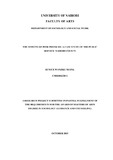| dc.description.abstract | This study focused on peer pressure among adults and how it affects the process of decision making using a case study of National Registration Bureau in the public service of, Nairobi County. The objectives of the study were to establish the prevalence of peer pressure among adults, to find out the factors that trigger peer pressure among adults, to investigate how pressures among adult peers can result to lack of independent decisions as well as responsible and irresponsible behavior, and to determine the importance of using independent judgment when making a decision.
The study was conducted in Nairobi County which comprises of eight constituencies namely Makadara, Embakasi, Starehe, Kasarani, Lang'ata, Dagoretti, Westlands and Kamukunji.
Primary data was collected using un-structured and structured questionnaires and a key informant guide. Secondary data was obtained from the register of employees and literature review on the subject of peer pressure. The respondents were selected from the middle adulthood ages 35year to 60 years. The data was analyzed, presented and interpreted using tables and figures whereby frequencies and percentages were presented.
Although it is commonly believed that adults make decisions based on their life experience, this is not always the case in most societies including Kenya. Many adults are unknowingly making decisions under the influence of peer pressure. There are various types of adult peer groups that can easily influence their decision making processes. Similarities of individual decisions across certain peer groups such as professional groups, religious, political and ethnic groups, management groups, age groups, social class groups and forth indicates some degree of peer influence in decision making process in adults contrary to common believe.
The factors that trigger peer pressure among adults in the civil service as revealed by the respondents included the need to belong, social status, and level of income bracket, low self-esteem and political affiliations.
With regard to the findings of the study, it was clear that peer pressure does not always affect decision making, though it affects behavior of an individual.
Guidance and counseling, encouraging team building and interaction with peers from other peer groups, encouraging individual performances, and equal distribution of resources and encouraging objective thinking were some of the solutions that emerged from the study to help adults cope with peer pressure | en_US |

